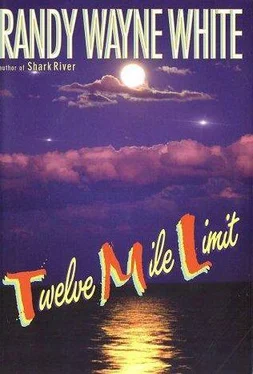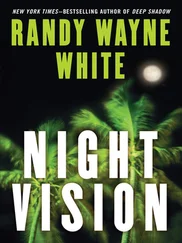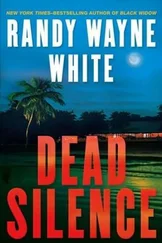Randy White - Twelve Mile Limit
Здесь есть возможность читать онлайн «Randy White - Twelve Mile Limit» весь текст электронной книги совершенно бесплатно (целиком полную версию без сокращений). В некоторых случаях можно слушать аудио, скачать через торрент в формате fb2 и присутствует краткое содержание. Жанр: Триллер, на английском языке. Описание произведения, (предисловие) а так же отзывы посетителей доступны на портале библиотеки ЛибКат.
- Название:Twelve Mile Limit
- Автор:
- Жанр:
- Год:неизвестен
- ISBN:нет данных
- Рейтинг книги:4 / 5. Голосов: 1
-
Избранное:Добавить в избранное
- Отзывы:
-
Ваша оценка:
- 80
- 1
- 2
- 3
- 4
- 5
Twelve Mile Limit: краткое содержание, описание и аннотация
Предлагаем к чтению аннотацию, описание, краткое содержание или предисловие (зависит от того, что написал сам автор книги «Twelve Mile Limit»). Если вы не нашли необходимую информацию о книге — напишите в комментариях, мы постараемся отыскать её.
Twelve Mile Limit — читать онлайн бесплатно полную книгу (весь текст) целиком
Ниже представлен текст книги, разбитый по страницам. Система сохранения места последней прочитанной страницы, позволяет с удобством читать онлайн бесплатно книгу «Twelve Mile Limit», без необходимости каждый раз заново искать на чём Вы остановились. Поставьте закладку, и сможете в любой момент перейти на страницу, на которой закончили чтение.
Интервал:
Закладка:
A disturbing bit of graffiti.
I worked my way through the crowd and finally found Tomlinson holding court next to the fireplace beneath a mounted tarpon. When I tried to talk to him, though, he was slurring his words so badly that I gave up.
I decided that, if there was going to be trouble, there was nothing I could do to stop it.
Turned out I was right.
Frieda Matthews, one of Florida’s best biologists and field researchers, motioned toward the lighted building and told me, “I’m supposed to be in there speaking tonight, but they fired me.”
I said, “You’re kidding.”
She smiled. “Nope. But I still get paid. In our line of work, that’s what counts, right?”
Feeling claustrophobic among all those people, I’d stepped outside and spotted Matthews leaning against a palm tree, sipping a fresh beer. I’d met her years ago at a symposium near her office in Tallahassee and had come to respect her work-particularly her articulate field-research papers. She’s a fine observer and has a gift for precise, lucid, declarative sentences. Unlike an unfortunate and growing number in our field, Matthews is an advocate of science, not a scientist who advocates a particular point of view. She is generally regarded as a leading expert on Florida’s sea mammals. Thus the manatee connection.
I asked, “They canceled your talk? Why?”
She was still smiling, a healthy-looking woman with a good jaw and short hair wearing a dark business suit with a pale blouse. “Why do biologists and expert witnesses usually get fired? Because their employers doesn’t want to hear what they have to say. The thing that really irks me is, their so-called experts in there obviously haven’t read my recent papers. If they had, they could have fired me by telephone, and I could’ve saved myself a trip. We’re swamped in Tallahassee, plus I had to leave my husband alone with our four-year-old.”
The implications of her sudden dismissal were interesting. Suddenly, I wished I’d brought a notebook.
“Let me get this straight,” I said. “The SAM people paid you to come here, but now they don’t want you to speak? I don’t get it.”
So the lady explained it to me. I stood there fascinated, listening, as Frieda listed the accumulated data as she knew it. She spoke softly, but as articulately as any of her fine papers.
She and her staff had spent the last five years collecting manatee data, she said, performing necropsies, doing manatee counts by plane and helicopter on both the Gulf and Atlantic coasts of Florida, yet it was only in the last three months that her team felt they had sufficient information to publish their partial conclusions.
“All valid biological data,” she told me, “indicate that the population of our West Indian manatee is increasing, not decreasing. Not only that, the population has been increasing for the last twenty-five years. The manatee should be taken off the endangered species list. It doesn’t belong there, and our research proves it. Florida has plenty of environmental problems, and that’s where the money should be spent. But the manatee people don’t want to hear that.”
I listened to her explain that the minimum manatee count has increased at a rate of 6 to 7 percent per year but that it was really probably closer to 10. “You know me, Doc. I always use the most conservative figures possible. I take my work damn seriously. I’m not going to manipulate or exaggerate the figures for anyone. At the cost of what? My professional reputation? No way.”
She went on to explain the data in detail, and the bottom line was that the sea cows were back and doing well. I didn’t say what I was thinking, though: I’d recently read a report issued by one of the federal agencies that said exactly the opposite. Boat-related manatee deaths had risen from 25 percent ten years ago to 33 percent now, and the increased death rate far outstripped the slow-growing manatee population. Furthermore, in that same ten-year period, Florida had registered more than a hundred thousand new boats-bad news for anything in the water that was big and slow moving. But here was Dr. Frieda Matthews telling me about her own work, her own observations. It was not the time to debate.
Instead, I said, “That’s great news. So why’s this the first I’ve heard it? There ought to be headlines. Instead, they’re trying to close down whole hectares of the water around here.”
She shrugged. “I’ve got a private theory about that, but I’d hate for you to get the impression I’ve gotten old and cynical. Don’t get me wrong, Doc. Manatees should continue to be fully protected, but they’ve recovered to a level where, clearly, they’re no longer an endangered species. Fish and Wildlife ought to down-list them from endangered to threatened, at most.
“This afternoon, I expected SAM’s board members to clap and cheer when I told them what I was going to talk about. They’ve done a hell of a good job getting the word out, educating boaters on what to look for and how to avoid contact. They deserve a fair share of the credit, right along with another club, Save the Manatee. I was going to tell them congratulations, score a big win for the good guys. Instead, I watched their jaws drop open, and they looked at me like I was a heretic. They couldn’t get me out of the room fast enough. The club’s president-get this, Doc-she’s afraid of big bodies of water, won’t get on a boat, but there she is, running the whole show. She actually screamed at me. Called me a liar and… what was the phrase?” Matthews tilted her head, thinking about it. “She called me a ‘stooge for the boating industry,’ that was it.
“Doc, we don’t get a cent from private enterprise. You know that. She has to know it, too, but it was like, because she said it, that made it true. So now a couple hundred people in there are convinced our entire project was bought and paid for by boat manufacturers. Their president has spoken, and that’s that. I had to be discredited, and that was the only way she could do it.” Matthews was shaking her head, frustrated and angry.
“God spare me fat, middle-aged, neurotic do-gooders!”
I said, “So why are they doing it?”
I watched her take a sip of her beer, eyebrows furrowed. She said, “Just between you and me? After they booted me, I went back to my room and used my laptop to do a little online research. The question seemed obvious to me: Why would any group continue to manufacture and promote an endangerment crisis that simply does not exist?”
“Money,” I said. “Group survival or some political agenda.”
“Probably all of the above,” she said. “You catch on quick. Save All Manatees was started by two people who had good reasons to be worried about the well-being of that animal. They worked their butts off raising money and expanding the membership. So now, fifteen years later, the membership’s grown to about half a million nationwide. It’s got an annual budget of a couple million. They’ve got a paid staff and a stable of attorneys on retainer. SAM isn’t just a club, it’s a growing industry. Same with a couple of state and federal jobs created to keep tabs on this particular animal. The department heads now employ assistants to the assistants of their assistants.
“So what happens if the manatee is all of a sudden taken off the endangered species list? They’re all out of business. So SAM, at least, has stayed aggressive. They file lots of lawsuits. People are going to stop donating if Fish and Wildlife down-lists the manatee, so they keep them on the defensive-that’s my guess, anyway-and, to get new members, they base their arguments on emotion, not science. Most of the bay areas they want to close to boat traffic have never had a manatee fatality in the thirty years we’ve been keeping records. That’s a fact. I went back and checked.”
Читать дальшеИнтервал:
Закладка:
Похожие книги на «Twelve Mile Limit»
Представляем Вашему вниманию похожие книги на «Twelve Mile Limit» списком для выбора. Мы отобрали схожую по названию и смыслу литературу в надежде предоставить читателям больше вариантов отыскать новые, интересные, ещё непрочитанные произведения.
Обсуждение, отзывы о книге «Twelve Mile Limit» и просто собственные мнения читателей. Оставьте ваши комментарии, напишите, что Вы думаете о произведении, его смысле или главных героях. Укажите что конкретно понравилось, а что нет, и почему Вы так считаете.












